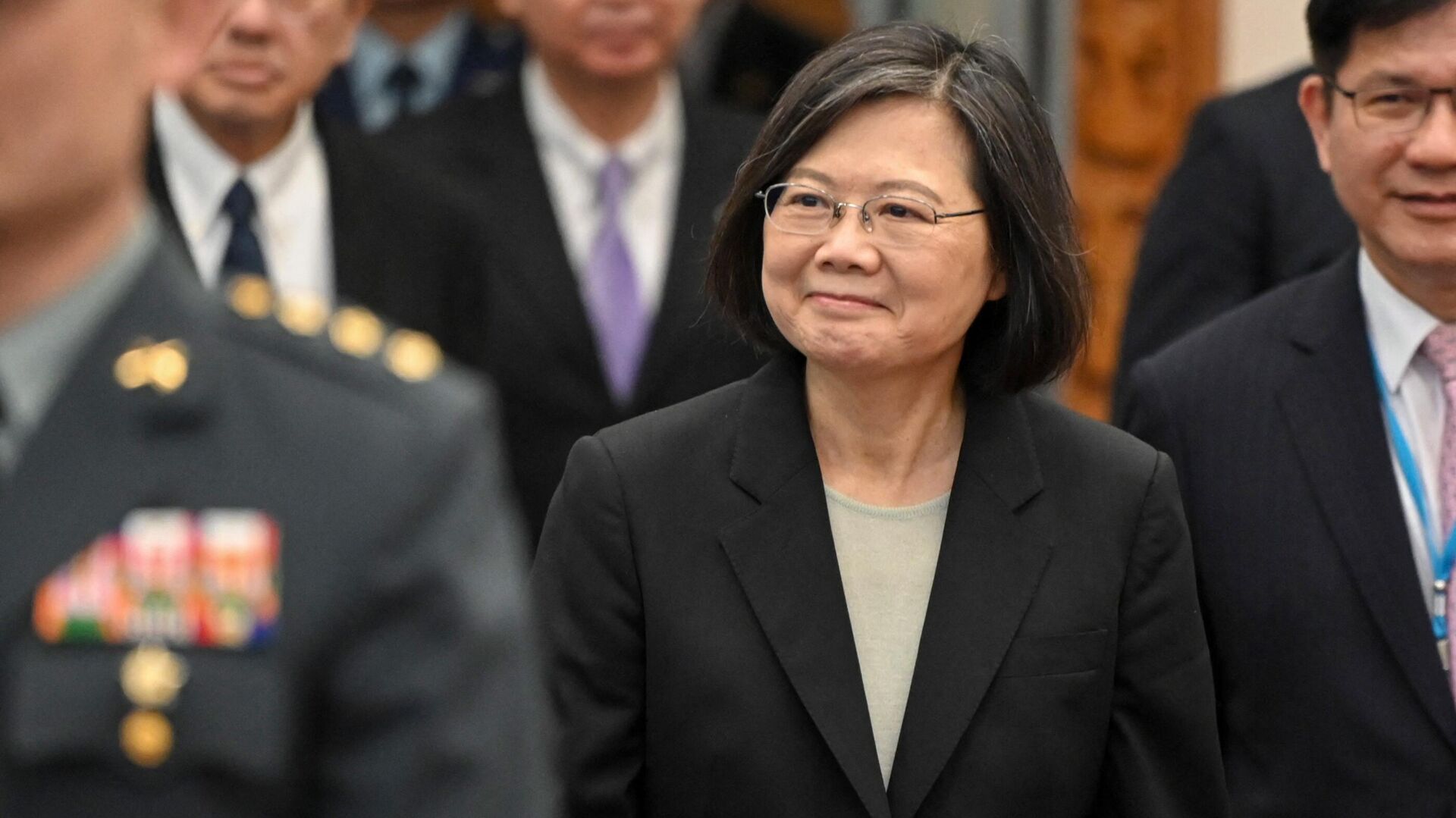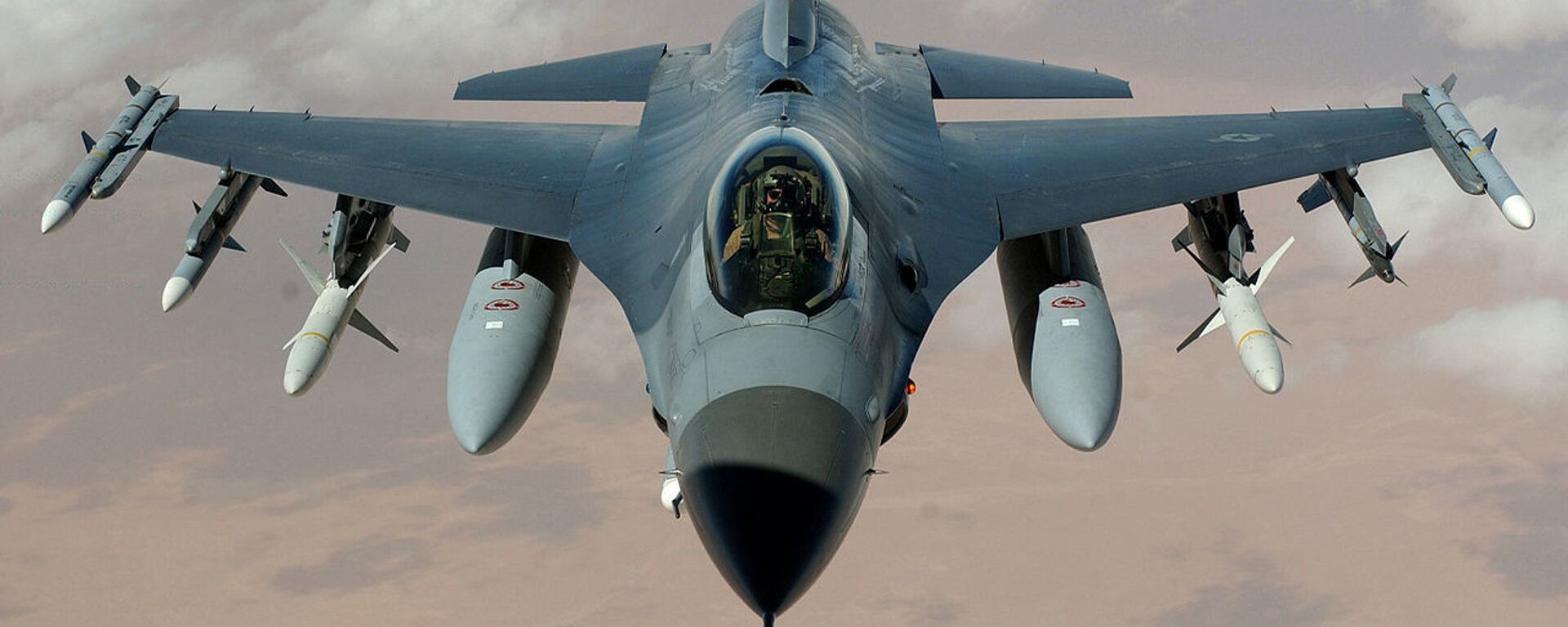https://sputnikglobe.com/20230329/taiwanese-president-to-make-unofficial-stopovers-in-us-while-on-tour-in-central-america-1108894613.html
Taiwanese President to Make ‘Unofficial’ Stopovers in US While on Tour in Central America
Taiwanese President to Make ‘Unofficial’ Stopovers in US While on Tour in Central America
Sputnik International
The US and China remain at odds over Taiwan, which is seen by Beijing as an essential part of Chinese territory.
2023-03-29T08:32+0000
2023-03-29T08:32+0000
2023-06-19T12:46+0000
world
us
china
tsai ing-wen
tour
guatemala
belize
taiwan
https://cdn1.img.sputnikglobe.com/img/07e7/03/1d/1108894319_0:145:2802:1721_1920x0_80_0_0_36c6769303499fd49e22069ea3686571.jpg
Taiwanese President Tsai Ing-wen left Taipei on Wednesday for a 10-day tour of Central America, during which she is due to visit Taiwan’s allies, Guatemala and Belize.Tsai’s office said that after arriving in New York, President Tsai would continue her trip by meeting Guatemalan counterpart Alejandro Giammattei on April 1 and Belize Prime Minister John Briceno on April 3. It will be followed by the Taiwanese president stopping in Los Angeles, in McCarthy’s home state of California, on her way home. This was preceded by China's Taiwan Affairs Office claiming in a statement that "This so-called transit by the Taiwan leader is essentially a provocation that aims to seek independence, relying on the US."The statement was earlier echoed by Chinese Foreign Ministry spokesman Wang Wenbin, who denounced Tsai’s planned trip, warning that Beijing disapproved of any contact between the governments of the US and Taiwan.A Paris-headquartered news agency meanwhile cited an unnamed senior Biden administration official as saying that "There's absolutely no reason for China to use that as a pretext to overreact or to engage in further coercion directed at Taiwan."In an apparent attempt to assuage diplomatic concerns, US National Security Council spokesperson John Kirby earlier argued that President Tsai’s stops in the US would be “unofficial” and “business as usual.”There is speculation, however, that the Taiwanese president’s trips to New York and Los Angeles will most likely add fuel to Beijing-Taipei tensions. One news network reported that Beijing “holds particular dislike for Tsai and the ruling Democratic Progressive Party, who see Taiwan as a de facto independent state although they have stopped short of declaring full independence to avoid a war with China.”“The complete reunification of the motherland is the common aspiration of all Chinese people and the meaning of national rejuvenation. One should actively promote the peaceful development of cross-Strait relations and resolutely oppose interference by outside forces and separatist activities aimed at achieving Taiwan independence," Xi told a Chinese National People's Congress session earlier this week.US-China Tensions Over Taiwan The US ended formal relations with Taiwan in 1979, as stipulated in the second communiqué and the US Congress-ratified Taiwan Relations Act that came into effect that year.Since then, the US has maintained a “strategic ambiguity” policy of neither encouraging Taiwanese independence nor its reconciliation with Beijing. Under the Taiwan Relations Act, the US continues to provide the island with arms to help Taipei to defend itself in case of any military event. This is vehemently opposed by Beijing, which sees Taiwan as an essential part of China, rejecting, however, a military scenario when it comes to the island’s reunification with the mainland.The situation around Taiwan escalated after then-US House Speaker Nancy Pelosi visited the island in early August 2022. China condemned the trip, dubbing it a gesture of support for separatism, and launched large-scale military exercises in the vicinity of the island in a retaliation move.Simmering Chinese-US tensions over Taiwan have deteriorated significantly during President Joe Biden's tenure amid the POTUS’ repeated promises to come to the island’s defense if it were “invaded” by China. In late 2021, Taiwan's Defense Ministry revealed that over 600 US military personnel have visited the island since 2019, in contravention of the One-China policy.On top of that, the US has repeatedly sent its warships to the Taiwan Strait, with Beijing slamming such missions as provocations and labeling Washington the "destroyer of peace and stability" and "a security risk creator” in the region.
https://sputnikglobe.com/20230302/pentagon-us-advances-possible-619mln-sale-of-f-16-munitions-to-taiwan-amid-china-tensions-1107922689.html
china
guatemala
belize
taiwan
Sputnik International
feedback@sputniknews.com
+74956456601
MIA „Rossiya Segodnya“
2023
Oleg Burunov
https://cdn1.img.sputnikglobe.com/img/07e4/09/0b/1080424846_0:0:2048:2048_100x100_80_0_0_3d7b461f8a98586fa3fe739930816aea.jpg
Oleg Burunov
https://cdn1.img.sputnikglobe.com/img/07e4/09/0b/1080424846_0:0:2048:2048_100x100_80_0_0_3d7b461f8a98586fa3fe739930816aea.jpg
News
en_EN
Sputnik International
feedback@sputniknews.com
+74956456601
MIA „Rossiya Segodnya“
Sputnik International
feedback@sputniknews.com
+74956456601
MIA „Rossiya Segodnya“
Oleg Burunov
https://cdn1.img.sputnikglobe.com/img/07e4/09/0b/1080424846_0:0:2048:2048_100x100_80_0_0_3d7b461f8a98586fa3fe739930816aea.jpg
taiwanese president tsai ing-wen's tour of latin america, tsai’s planned unofficial stopovers in the us, china-us tensions over taiwan
taiwanese president tsai ing-wen's tour of latin america, tsai’s planned unofficial stopovers in the us, china-us tensions over taiwan
Taiwanese President to Make ‘Unofficial’ Stopovers in US While on Tour in Central America
08:32 GMT 29.03.2023 (Updated: 12:46 GMT 19.06.2023) The US and China remain at odds over Taiwan, which is seen by Beijing as an essential part of Chinese territory. Washington-Beijing tensions escalated following what China described as a "provocative" visit by then-US House Speaker Nancy Pelosi to Taiwan last year.
Taiwanese President Tsai Ing-wen left Taipei on Wednesday for a 10-day tour of Central America, during which she is due to visit Taiwan’s allies, Guatemala and Belize.
The tour will see Tsai’s planned unofficial stopovers in the US, where she is expected to meet with congressional leaders including House Speaker Kevin McCarthy.
Tsai’s office said that after arriving in New York, President Tsai would continue her trip by meeting Guatemalan counterpart Alejandro Giammattei on April 1 and Belize Prime Minister John Briceno on April 3. It will be followed by the Taiwanese president stopping in Los Angeles, in McCarthy’s home state of California, on her way home.
In an apparent nod to China, Tsai herself told reporters at the airport before departing that “External pressure will not hinder our determination to go global. We are calm and confident. We will not succumb and we will not provoke (others).”
This was preceded by China's Taiwan Affairs Office claiming in a statement that "This so-called transit by the Taiwan leader is essentially a provocation that aims to seek independence, relying on the US."
The statement was earlier echoed by Chinese Foreign Ministry spokesman Wang Wenbin, who denounced Tsai’s planned trip, warning that Beijing disapproved of any contact between the governments of the US and Taiwan.
“We again warn the Taiwan authorities that there is no way out for Taiwan independence, and any illusions about attempts to collude with external forces to seek independence and provocation are doomed to fail,” Wang pointed out.
A Paris-headquartered news agency meanwhile cited an unnamed senior Biden administration official as saying that "There's absolutely no reason for China to use that as a pretext to overreact or to engage in further coercion directed at Taiwan."
In an apparent attempt to assuage diplomatic concerns, US National Security Council spokesperson John Kirby earlier argued that President Tsai’s stops in the US would be “unofficial” and “business as usual.”
“There’s no reason for China to overreact. Heck, there’s no reason for them to react. This is something that, as I said, is commonplace,” Kirby told reporters, referring to Tsai’s stopovers in the US.
There is speculation, however, that the Taiwanese president’s trips to New York and Los Angeles will most likely add fuel to Beijing-Taipei tensions. One news network reported that Beijing “holds particular dislike for Tsai and the ruling Democratic Progressive Party, who see Taiwan as a de facto independent state although they have stopped short of declaring full independence to avoid a war with China.”
The remarks followed Chinese President Xi Jinping stressing that the Communist Party of China's strategy for resolving the Taiwan issue must be implemented and the One-China principle upheld. Xi also underlined that the 1992 consensus between Beijing and Taipei must be maintained.
“The complete reunification of the motherland is the common aspiration of all Chinese people and the meaning of national rejuvenation. One should actively promote the peaceful development of cross-Strait relations and resolutely oppose interference by outside forces and separatist activities aimed at achieving Taiwan independence," Xi told a Chinese National People's Congress session earlier this week.
US-China Tensions Over Taiwan
The US ended formal relations with Taiwan in 1979, as stipulated in the second communiqué and the US Congress-ratified Taiwan Relations Act that came into effect that year.
Since then, the US has maintained a “strategic ambiguity” policy of neither encouraging Taiwanese independence nor its reconciliation with Beijing. Under the Taiwan Relations Act, the US continues to provide the island with arms to help Taipei to defend itself in case of any military event. This is vehemently opposed by Beijing, which sees Taiwan as an essential part of China, rejecting, however, a military scenario when it comes to the island’s reunification with the mainland.
The situation around Taiwan escalated after
then-US House Speaker Nancy Pelosi visited the island in early August 2022. China condemned the trip, dubbing it a gesture of support for separatism, and launched large-scale military exercises in the vicinity of the island in a retaliation move.
Simmering
Chinese-US tensions over Taiwan have deteriorated significantly during President Joe Biden's tenure amid the POTUS’ repeated promises to come to the island’s defense if it were “invaded” by China. In late 2021, Taiwan's Defense Ministry revealed that over 600 US military personnel have visited the island since 2019, in contravention of the One-China policy.
On top of that, the US has repeatedly sent its warships to
the Taiwan Strait, with Beijing slamming such missions as provocations and labeling Washington the "destroyer of peace and stability" and "a security risk creator” in the region.




